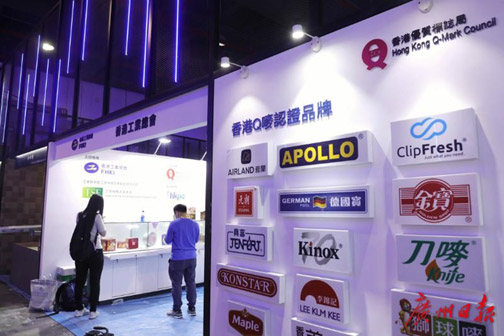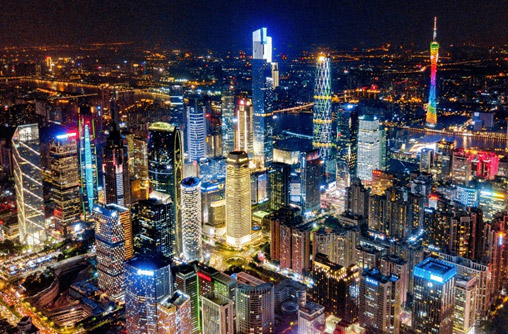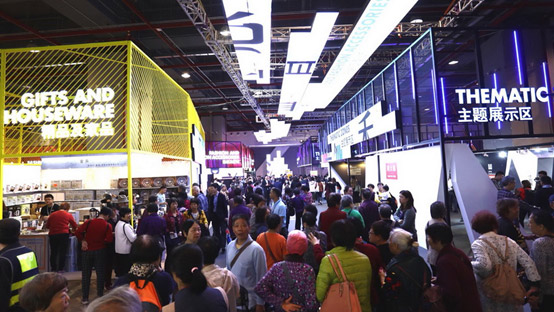9-13 January, 2020 | Guangzhou – Trade opportunities have been significantly boosted following the successful conclusion of “Chic Hong Kong,” a five-day exposition that drew nearly 130,000 visitors and potential buyers, many of them were top global firms.
The event was conducted from 9 to 13 January 2020 and was the result of firm commitment and collaboration among different stakeholders, with the local government of Guangzhou playing an important role. The event, covering the total area of 12,000 square metre, provided a platform for more than 180 Hong Kong leading brands to meet their potential partners and customers in Guangzhou. The big players displayed their products, ranging from food, garments, jewellery, housewares to fashion design, intelligent retail, professional certification services. Among these top global brands were Hong Kong-based Chow Tai Fook, Lee Kum Kee, Sea Horse, Hong Kong Q-Mark Council, as well as Guangzhou-based VIPSHOP (one of China’s top e-business companies), Freshhema (a community-based one-stop retail platform, also an affiliate of Alibaba Group), and MINISO.
The significance of this event goes beyond selling and buying. It was the first exposition that was hosted in mainland China by a Hong Kong-based institution – Hong Kong Trade Development Council (HKTDC), since China launched the Outline Development Plan for the Guangdong-Hong Kong-Macao Greater Bay Area in early 2019. It essentially is a blueprint aimed to “develop a vibrant and internationally competitive first-class bay area, a world-class city cluster, and a model of high-quality development.”
In the past, strict and complicated vetting policy had discouraged Hong Kong organisations from hosting exhibitions in mainland China. According to Ms. He Qiaomei, HKTDC representative in Guangzhou, what Hong Kong institutions could previously do was no more than co-hosting with qualified hosts in mainland China. The highlight of HKTDC being the host of “Chic Hong Kong” lies in the clarity of intellectual property ownership of the exhibits from famous Hong Kong brands. Another advantage of the exposition is that it opened until 8 p.m., whilst previous exhibitions would usually close in late afternoon. This suggests the emerging trend of “night economy,” a new trade mode in this vibrant and inclusive city.
When HKTDC applied to host “Chic Hong Kong” in Guangzhou, the local government took the initiative to help make it possible. Guangzhou Municipal Commerce Bureau issued the Guide for Hong Kong and Macao Service Providers to Independently Host Foreign-related Economic and Technical Exhibitions in Guangzhou in November 2019. China Council for the Promotion of International Trade Guangzhou Committee (CCPIT Guangzhou) and China Chamber of International Commerce Guangzhou Chamber of Commerce (CCOIC Guangzhou) also took proactive measures to assist HKTDC in its timely coordination with relevant local authorities, completing the approval procedures for accreditation, customs, security, fire safety, intellectual property rights (IPRs) protection, among others.
Besides, Guangzhou government at both municipal and district levels worked with HKTDC to set up the first onsite joint complaint station for intellectual property disputes, in a bid to protect IPRs of the participants. Equipped with abundant experience of helping local enterprises in protecting their IPRs in overseas exhibitions, CCPIT Guangzhou also organised theme trainings, compiled the IPRs protection manual, and provided services on IPRs consultation.
What Guangzhou has done highlighted local concrete implementation of China’s resolution in optimising the business environment. In 2019, China’s Ministry of Commerce deepened the reform in exhibition industry by simplifying the examination procedure. The reform clarified that Hong Kong and Macao service providers are entitled to apply to host exhibitions in 15 pilot provinces and municipalities directly under the Central Government. In line with the national policy, Guangzhou City took the lead to propose the work programme to “support Hong Kong and Macao institutions to host exhibitions (in mainland China).” “Chic Hong Kong” is an embodiment of Guangzhou’s efforts in building and maintaining the international and modern business environment.
According to the Global Urban Competitiveness Report 2018-2019: Global Industry Chain: Creating a Networked City Planet jointly released by Chinese Academy of Social Sciences (Financial and Economics Institute) and UN-HABITAT, Guangzhou ranks the 14th in terms of global urban economic competitiveness among cities in the world and enters into top 100 concerning sustainable competitiveness. Domestically, Guangzhou is among China’s 34 top major cities with regard to business environment, as stated in the Survey on Chinese Business Environment and Private Entrepreneurs Comments, a report led by Chinese Academy of Social Sciences in December 2019.
This expo is a milestone in promoting regional and international economic and trade development. CCPIT Guangzhou will continue to help internationalise, legalise and optimise the business environment in Guangzhou by consulting and reflecting suggestions from overseas business organisations in Guangzhou, providing high-quality commercial legal services, and mobilising resolutions from reasonable claims of corporates. It represents not only what Guangzhou Municipal Government believes in, but also what it acts upon – let the market play its role to the fullest and provide enterprises with assistance when necessary. Such balanced relationship between government and market enables Guangzhou to become and continue to be an internationally competitive business and trade center.
By optimising the business environment and promoting development-oriented economic and trade, Guangzhou endeavors to achieve the Sustainable Development Goals (SDGs), especially SDG 8: promote sustained, inclusive and sustainable economic growth, full and productive employment and decent work for all.


(Sources: Xinhua News Agency, Guangzhou Municipal People’s Government, Guangzhou Municipal Commerce Bureau, CCPIT Guangzhou, Center for City and Competitiveness of Chinese Academy of Social Science, Guangzhou Daily)











